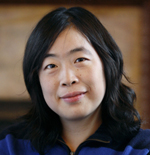
The White House announced Sept. 27 that Lan Yang, PhD, assistant professor of electrical and systems engineering in the School of Engineering & Applied Science at Washington University in St. Louis, has been named a recipient of the Presidential Early Career Awards for Scientists and Engineers (PECASE).
The early career award is the highest honor bestowed by the United States government on science and engineering professionals in the early stages of their independent research careers. This year, there are 94 recipients.
“It is inspiring to see the innovative work being done by these scientists and engineers as they ramp up their careers — careers that I know will not only be personally rewarding but also invaluable to the nation,” President Barack Obama said in the award announcement. “That so many of them are also devoting time to mentoring and other forms of community service speaks volumes about their potential for leadership, not only as scientists but as model citizens.”
“I am pleased that the President has honored Lan with this special award for her world-class record of achievement,” says Ralph S. Quatrano, PhD, dean of the School of Engineering & Applied Science.
“She is a model for other assistant professors, and I have great confidence in her potential for continued future success. As only the fourth assistant professor at Washington University to receive this prestigious recognition since its inception 15 years ago, this award brings great visibility to Lan and her innovative work and to our school and university,” Quatrano says.
The other three WUSTL recipients were Shirley J. Dyke, PhD, then-assistant professor of civil engineering, who received the award in 1999, Michael L. Dusting, PhD, then-associate professor of pathology and assistant professor of biomedical engineering at the School of Medicine, who received the award in 2000, and Kelly Botteron, then-assistant professor of psychiatry (child) and radiology in the School of Medicine, who received the award in 2001.
Joseph Jez, PhD, now associate professor of biology in Arts & Sciences, received the award in 2005 when he worked at the Danforth Plant Science Center.
Yang received the award “for innovative research in microlasers on a silicon wafer and development of photonic devices with applications from opticalcommunications to ultra-sensitive biochemical sensing; and for pioneering studies of real-time, in-situ detection and sizing of nanoparticles using low-power on-chip devices.”
The tiny ring lasers her laboratory makes have many applications, including characterizing nanoparticle products, detecting impurities such as soot in air, and detect viruses or proteins in the bloodstream.
For more information about Yang’s work, visit her lab site, or the related stories to the right.
“It’s a very great honor to receive the Presidential Early Career Award,” Lan says. “Combining nanotechnology and photonics has allowed us to create devices that can do more than ever before. For example, we have built an on-chip optical resonator that can size single nanoparticles in a single shot measurement.
“With the support provided by PECASE, we will continue to explore the use of novel photonic devices to characterize nano-scale structures with applications in environmental engineering, energy and biomedicine,” Lan says.
Sixteen federal departments and agencies join together annually to nominate the most meritorious scientists and engineers whose early accomplishments show the greatest promise for assuring America’s preeminence in science and engineering and contributing to the awarding agencies’ missions.
The awards, established by President Bill Clinton in 1996, are coordinated by the Office of Science and Technology Policy within the Executive Office of the President.
Awardees are selected for their pursuit of innovative research at the frontiers of science and technology and their commitment to community service as demonstrated through scientific leadership, public education or community outreach.
Yang will travel to Washington, D.C. to receive the award from President Obama.